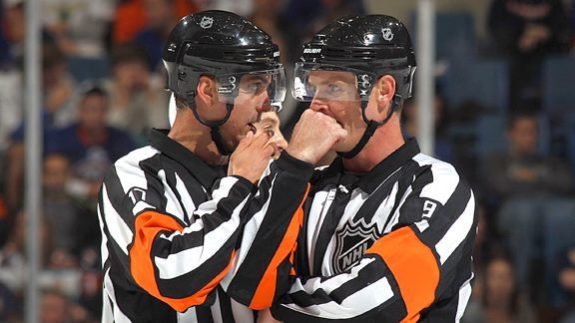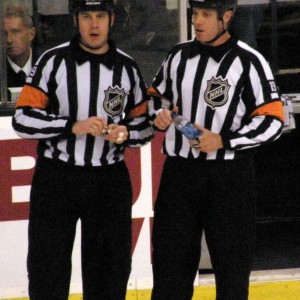There are some who will argue that the Oilers are the only ones to blame for the fact that they are now down 3-2 in the best-of-seven series against the Anaheim Ducks. To a degree, Edmonton does need to take responsibility for defensive breakdowns, misreads and the inability to clear the defensive zone, but the reality is, this is now two consecutive games in which the outcome of a pivotal playoff matchup has been decided by missed calls from the referees and the NHL.
That these calls are being missed is not only taking away from the series, but it’s becoming an embarrassment for the league who needs to get these calls correct for the integrity of the game.
Game 4
In the game that saw Anaheim tie the series, Corey Perry — of his own volition — clearly bumps Cam Talbot while Talbot is trying to make the initial save. If you want a good breakdown of how this got past the NHL, take a look at Tim & Sid’s take on the incident. No, they can’t explain it either.
The key here isn’t so much that this goal was a backbreaker for the Oilers. It’s that the coaches challenge was lost by Edmonton and Todd McLellan which later became a monumental turn of events as McLellan surrendered his ability to challenge a missed offside call that happened later in the game. That offside led to a goal for Anaheim and ultimately the loss for the Oilers.
Oiler fans were in disbelief after Game 4. Many were simply dumbfounded. If it weren’t for the following contest, this series of events would still be talked about. As it were, things only got worse in Game 5.
Game 5
The Oilers took a commanding three-goal lead into the final minutes of the third period on Friday. The way the series has gone, you almost had to know that something was going to turn south and it did, in a colossal way. Starting at the 3:25 mark, Ryan Getzlaf started the comeback. In less than three minutes, Anaheim scored three times to tie the game.
The Oilers meltdown was something else, but the final goal was a disaster as again the referees and the NHL made the wrong call.
In this case, the interference by Ryan Kesler was a bit harder to see as the play took place, but upon review it becomes clear that Kesler took advantage of being knocked into the crease by the Oilers Darnell Nurse and instead of getting back into the play, chose to stay down and eventually grabbed Talbot’s pad with his left hand, impeding the goaltender’s ability to make a proper save.
By any definition, that play by Kesler should be ruled goaltender interference. Had that call been made correctly, the Oilers would have won the contest and headed back home with a chance to close out the series. Somehow, while looking at the replay during an NHL-mandated challenge in the final minute of the game, not one referee, nor off-ice official noticed.
[irp]
Why Are These Calls Being Missed?

While presently, it’s glaringly deciding the outcome of an entertaining series, it’s not just the Oilers games in which the referees are making incorrect calls. It’s happening time and time again and it’s become a real issue that the league will have to discuss at their future NHL and manager’s meetings. To my eye, there’s only one explanation for how these calls are being so poorly handled.
Because coach’s challenges are set up in such a way that a challenge must be conclusive enough to overrule an on-ice decision, the entire process becomes a “did we get the play wrong” viewing. If the referees see what they were initially looking for — in the case of Game 5, Nurse pushing Kesler into the crease — they don’t dig deeper to see that Kesler is grabbing the goaltender’s pad.

If for some reason the officials still aren’t sure, the review then gets sent to the Situation Room in Toronto who has to confirm that there is enough evidence to say the referees simply missed it. The NHL and the referees themselves don’t want to show each other up, thus both are looking for things the refs got right, not what the actual play was.
This theory is called confirmation bias and how it is affecting these games is explained well by David Staples. By definition, confirmation bias is the tendency to search for, interpret, favor, and recall information in a way that confirms one’s preexisting beliefs or hypotheses. It is extremely difficult to get around confirmation bias if the challenges are initiated and controlled by any party involved in the incident. In these cases, it’s as though the officials are putting themselves on trial. Understandably, they aren’t likely to find themselves guilty.
Will the NHL say they made a mistake or just keep covering for terrible officiating.
— Grant Fuhr (@grantfuhr) May 6, 2017
The Result
What stems from these incorrect calls is total confusion over the rules of the game. Ask any Oiler, ask any hockey fan and ask most media or hockey analysts and they’ll tell you they now no longer understand what goaltender interference is. The releases that come from the NHL after the fact don’t do much to clear up any confusion. That’s a shame.
These rules and the ability to challenge calls are set up to protect each contest from being decided by something the refs may have missed. At least, I think that was the intention.
At the end of the day, referees are human and human errors occur often. But, instead of correcting the miscues, games are being decided because no one wants to admit a mistake. This is a real problem the NHL will have to look at. For the Oilers, it’s unfortunate that it could be too little too late.